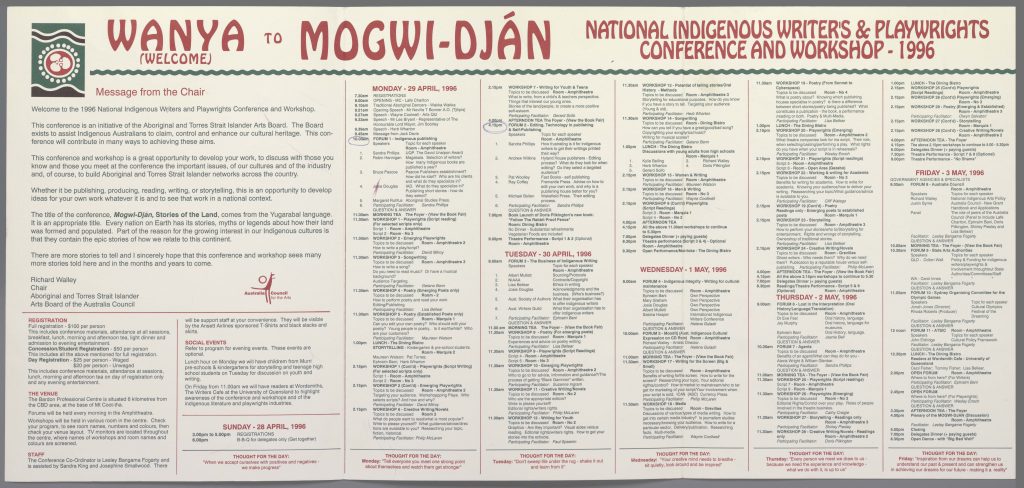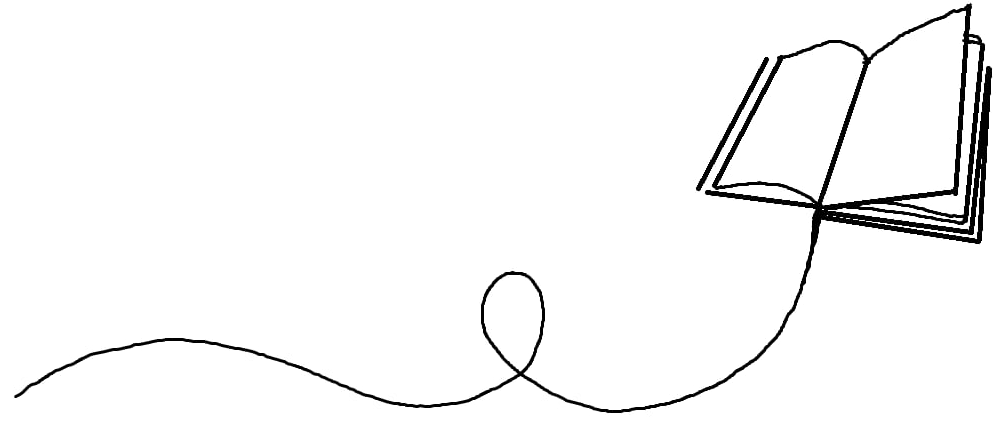27 The Black Australian writing archive
Ellen van Neerven
I am responding to the Mogwi-Djan: National Indigenous Writer’s and Playwright’s Conference and Workshop 1996 program I found in the Black Australian Writers folder. The program – on a large sheet of paper – caught my eye and I spent eager time perusing the contents.

This conference was at Bardon Professional Centre in 1996. The name of the conference, Mogwi-Djan, comes from the Yugarabal phrase meaning ‘Stories of the Land’ and the convenor was Lesley Bangama Fogarty.
I recognised most of the names of speakers but there were some I didn’t know. I understand some of these writers and presenters have since passed away. It looked like a comprehensive program over six days that featured many different genres and issues. It highlighted a range of speakers and included storytelling with children and high school students.
This was not the first Aboriginal and Torres Strait Islander writers’ conference in Australia, with records of earlier conferences in the 1980s, for example, but it does seem to be the largest.
Dr Sandra Phillips is quoted in Dr Anita Heiss’s book Dhuuluu-Yala: To Talk Straight – Publishing Indigenous Literature 1 as saying that this workshop was an opportunity for Black writers to ‘transfer skill not in a formulaic way but almost as if by osmosis through discussion and sharing of insight’. More than 100 people were in attendance.
There was a follow-up to this event in the form of the one-day 1998 Indigenous Writers Symposium held at the University of Queensland. I understand there were further conferences in other years that were playwrighting-specific.
After more than a 20-year gap, the spirit of Mogwi-Djan was in some ways replicated in the FNAWN (First Nations Australian Writers Network) three-day workshops held in 2013 (Brisbane), 2015 (Melbourne), and 2018 (Canberra), which I attended. Additionally, festivals like the Blak and Bright Festival were held in Melbourne in 2016, 2019 and 2022, although I see writers’ festivals as being separate to the idea of a conference and workshop. Writers’ festivals don’t usually directly allow space or encourage writing, despite their name. They are a way for writers to meet readers and to promote their books.
Reflecting back on that 1996 conference program, there are topics that are still relevant in 2022. I can’t imagine us all having the time now to spend six days together in the same location. Everyone seems to be so time-poor, yet we seem to have made so many gains.
What attracted me most to this 1996 program is the ‘Thought of the day’ column at the bottom of the page, in the border. There was a thought of the day for each day, starting with Sunday.
Sunday
‘When we accept ourselves with positives and negatives – we make progress’.
Monday
‘Tell everyone you meet one strong point about themselves and watch them get stronger’.
Tuesday
‘Don’t sweep life under the rug – shake it out and learn from it’.
Wednesday
‘Your creative mind needs to breathe – sit quietly, look around and be inspired’.
Thursday
‘Every person we meet we draw to us – because we need the experience and knowledge – what we do with it, is up to us’.
Friday
‘Inspiration from our dreams can help us understand our past and present and can strengthen us in achieving our dreams for our future – making it a reality’.
I like how these ‘Thoughts of the day’ function as both writing prompts and grounding advice that can inform the collective during the conference.
More and more I have grown to despise writers’ festivals, their encouragement of gossip, atomisation of the writer, conflation of alcohol as central to creative cultures, the ugly white gaze, dangerous hijacking of non-Indigenous people onto Black business, and lateral violence that might be a greater and unfortunate natural consequence of pitting writers against each other in competitions and competitive spaces.
Is it just me or does it feel harder to write than ever?
We have a shared responsibility to create environments which nourish Black writers through supported skill-sharing and encouragement of creativity. The list of six ‘Thoughts of the day’ in the 1996 Mogwi-Djan program offers sage and timely advice. I will be using them as prompts to write.
References
- Anita Heiss (Wiradjuri) (2003), Dhuuluu-Yala: To Talk Straight – Publishing Indigenous Literature , Aboriginal Studies Press.
* * *
Links to the Fryer Library Collection
Australia Council. Aboriginal and Torres Strait Islander Arts Board, ‘Mogwi-Djan: National Indigenous Writer’s and Playwright’s Conference and Workshop’, 1996, University of Queensland Press Records, UQFL198, Box 475, Folder 8, Fryer Library, The University of Queensland.
Heiss, A. (Wiradyuri) (2003). Dhuuluu-yala = to talk straight : publishing indigenous literature. Aboriginal Studies Press.

Biography
Ellen van Neerven is a Mununjali writer and editor. Their books include Heat and Light (UQP, 2014), Comfort Food (UQP, 2016) and Throat (UQP, 2020).

